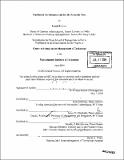Hurdles in the business case for the Semantic Web
Author(s)
Provost, David, 1959-
DownloadFull printable version (2.480Mb)
Other Contributors
Massachusetts Institute of Technology. Management of Technology Program.
Advisor
Brian Subirana and James M. Utterback.
Terms of use
Metadata
Show full item recordAbstract
The nuclear winter that filled the vacuum created by the Internet implosion was characterized by highly conservative investments in new technologies. This was particularly true for Internet- and Web-oriented technologies since after all, being a believer just wasn't as popular as it used to be. However, life, business, and science go on, and the Web is no exception. This thesis will examine hurdles in the business case for the Semantic Web. In one sense, the Semantic Web is an extension or enhancement of the existing World Wide Web (Web). As we know it today, the Web is a rich medium that allows humans to express themselves, learn, interact, and reach an audience that was a pipe dream just a decade ago. At the same time, the Web is of limited utility to computers (machines). For example, a human being could easily recognize a postal address or the specifications of an order for steel; a machine could not. To a machine, these data would simply be elements to be rendered and displayed on a monitor, with no intrinsic or cumulative meaning. In this sense, one of the goals set for the Semantic Web is to create meaning and utility for machines that allows for interpretation and action with far less human intervention. Issues related to the challenges, practicalities, theories and opportunities of the Semantic Web will be discussed. In the process, hopefully, this thesis will identify some of the stepping stones in building a business case for this evolution. Notably, today's comments regarding the Semantic Web sound very similar to what was once said about the practicalities of eBusiness and the likelihood of its adoption.
Description
Thesis (S.M.M.O.T.)--Massachusetts Institute of Technology, Sloan School of Management, Management of Technology Program, 2004. Includes bibliographical references (leaves 29-34).
Date issued
2004Department
Management of Technology Program.; Sloan School of ManagementPublisher
Massachusetts Institute of Technology
Keywords
Management of Technology Program.